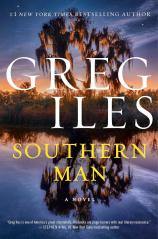Interview: June 13, 2024
After a five-year hiatus, Greg Iles is back with SOUTHERN MAN, the hugely anticipated new Penn Cage thriller that captures the political unrest of a nation dangling between a chaotic past and an unpredictable future. In this interview conducted by Bookreporter reviewer Ray Palen, Iles explains his inspiration for writing the Natchez Burning trilogy and this latest novel, which takes place 15 years ahead of the trilogy. He also talks about his decision to include the character of third-party candidate and conservative radio talk show host Robert E. Lee White in the story, the role that he feels fiction should play going forward, the possibility of adapting these books as a film or series, and the health crisis he went through while writing SOUTHERN MAN that nearly cost him his life.
Bookreporter.com: SOUTHERN MAN is set 15 years after the events of the Natchez Burning trilogy. What inspired you to write these stories and then follow up the series with this novel?
Greg Iles: What inspired me to write the Natchez Burning trilogy was the work of Stanley Nelson, a heroic reporter who was working just across the river from my hometown of Natchez. Stanley was working decades-old cold cases that the FBI had failed to solve, and he was doing it primarily to help the families of the victims, who were mostly just working-class people, not civil rights activists. But what drove me to write SOUTHERN MAN --- and to set it 15 years ahead of the trilogy, in our present --- was two things: first, unresolved issues from the trilogy itself that readers had been writing me about for years; and second, the insane political phase that our country entered after 2016, and the dangers that I saw early on we would face as a nation as white supremacists began to step into the open and try to distort the internal dynamics of our nation.
BRC: Is Penn Cage based on anyone in particular?
GI: Penn Cage and I have always shared a certain amount of character traits, but we were never one and the same. As I wrote my way through the Natchez Burning trilogy, we probably grew closer together. But it was the four years it took to write SOUTHERN MAN that finally melded us together. During that period, my mother was diagnosed with the same incurable blood cancer I had been keeping secret for years, and I had to watch her die from it. Enduring this process, I found it impossible to exclude these unique and intense elements of our family life from the novel. By the time I was writing the conclusion, Penn and I had largely become one.
BRC: This book eerily mirrors our current reality as another civil war is not out of the realm of possibility. I know how Penn handled matters in Mississippi. But what do you think needs to be done in the real world to prevent such events from occurring again?
GI: I believe we’re down to the point where our only option now is to protect democracy by voting against fascism wherever it raises its head. We’re also going to have to find a way to take action against the corruption of once-sacred institutions like the Supreme Court. Men like Clarence Thomas and Samuel Alito are so patently corrupt --- or opposed to the separation of church and state --- that the nation faces the very real danger of losing the forum our founders intended. Yet the mechanisms for resisting this kind of danger are very weak and difficult to implement.
BRC: I have seen SOUTHERN MAN called an alternate-reality novel of our current world. The book uses so many real-world references, characters and events that it almost reads like “new fiction.” How important was it for you to remain so connected to these issues, and what are your thoughts on alternate reality versus speculative fiction?
GI: I don’t feel that SOUTHERN MAN is really an alternate-reality or speculative novel. That said, it does raise the prospect of what might happen in this dangerously polarized election year in which we find ourselves. In my view, the potential for violence before November 2024 is great; on some level it’s probably inevitable. As for me using so many real-world figures, we’re in such a specific situation that trying to mask it with fiction (Robert Penn Warren did, for example, in ALL THE KING’S MEN) seemed pointless. I wanted to explore the spectrum of motives on the side of white supremacists of various classes, as well as reactions among important members of the Black community to the kinds of white responses we see in this novel --- such as rage and panic at the burning of the antebellum homes, or attempts by the white leadership class to subvert legitimate Black power in Mississippi.
BRC: How did you come up with the character of third-party candidate and conservative radio talk show host Robert E. Lee White?
GI: Believe it or not, I only came up with Bobby White halfway through the four years it took to write this book. That’s incomprehensible to me now, but it’s true. I was watching TV late one night and caught a rerun of my friend and bandmate Stephen King’s film, The Dead Zone, with Martin Sheen and Christopher Walken. It hit me like a bucket of ice water that what I needed was my own Greg Stillson character. Not one that was LIKE Stillson, because Trump was already in the book as himself, and Steve did an unbelievable job of predicting the rise of Trump decades before it happened. HE always recognized that hunger among a certain segment of Americans. What scares me most now is my belief that if the Bobby White I created was to step on the American stage at this point in time, he easily might win the presidential election.
BRC: What role do you think fiction should play going forward? Should it reflect the world around us, distract us from it, or do a little of both?
GI: The role fiction should play is obviously up to each author. I’ve used it for various reasons in my career, usually to explore the nature of what we call evil. But I’ve never used it in the manner I have in SOUTHERN MAN, as a warning to my fellow citizens about the unprecedented stakes of the present election. In the Natchez Burning trilogy, I used the suspense and action of the thriller genre to seduce people into reading about a subject they otherwise might avoid, and that effort proved largely successful. I’m anxious to see if SOUTHERN MAN fulfills my hope as a sort of distress signal and warning about the nature of the potential fates that await our country after November.
BRC: The song “Southern Man” plays a big role in this novel. What symbolism do those lyrics carry within the narrative?
GI: The original version of “Southern Man” by Neil Young --- a Canadian at the time --- was an important song when it came out, and it has some interesting relevance in relation to the supposed feud between Neil and the Alabama band Lynyrd Skynyrd. But in this novel, I have a Black rapper and tour guide rewrite the lyrics to fit his own point of view. That character clearly liked the passion of Young’s song and its intent, but he wanted to put his own stamp on it.
BRC: In a recent interview with the Los Angeles Times, you indicated that you nearly died during the writing of SOUTHERN MAN and feared this might be the last thing you would ever write. Can you kindly expand on that for readers who are not aware of your personal situation?
GI: In 1996, at the age of 36, I was diagnosed with a terminal blood cancer. It has just killed Sam Walton, the founder of Walmart, and my prognosis was grim. After nearly dying from experimental treatment, I withdrew from the medical system altogether. And to my amazement, I turned out to be in the luckiest one percent of patients who lived quite a long time without lethal progression of my cancer. But while writing SOUTHERN MAN, my cancer “switched on” without me knowing, and it came very close to killing me.
I spoke earlier about why I ultimately included this reality in my portrayal of Penn, but his cancer serves many functions in the novel. It gives him a vulnerability and mortality that many “heroes” of suspense-type series never really have. Those characters might go through a lot of danger, but you never really believe they might die. But I think the reality that underlies Penn’s situation gives you an almost inevitable sense of impending death, and a very real sense of what it’s like to live with terminal illness --- which I’m afraid I know all too well. The other functions served by the illness I would prefer to leave to readers to find out for themselves.
BRC: If SOUTHERN MAN is indeed the last thing you ever write, you have left a legacy that ends with a mammoth novel where not even one thought is wasted. What message do you want readers to take away from this book?
GI: I hope this novel accomplishes several things. One, I hope people see that many of the sins for which the South --- and Mississippi in particular --- have long been excoriated are not geographically defined sins. Since 2016 (and long before), we have seen it graphically and violently demonstrated that racism and white supremacy exist all over the nation. They are simply better concealed in some places than others. I also hope that significant numbers of white readers --- through the Black characters in this book --- see the world through different eyes, at least for a little while. I also hope that the flashback sequences give people a far more accurate view of what it was like to live before and during the Civil War than the Lost Cause Mythology most of us were raised on. But most important, I hope this novel --- thriller though it is --- serves to warn my fellow citizens about the kinds of violence that certain individuals and groups could be planning at this moment in the hopes of turning the United States into an authoritarian government rather than a republic.
BRC: The Natchez Burning trilogy and SOUTHERN MAN are modern-day literary classics. Has there been any discussion about adapting them as a film or series?
GI: We have come very close more than once to having the Natchez Burning trilogy turned into a streaming series. Just a few months ago, I received an offer from one of the major services who is interested in creating a series around the Penn Cage character. But I’m in a place in my career where I have different aspirations than a lot of authors might. I don’t simply want a successful series. I want producers and a director who truly understand the South. Just as important, I want major parts of the series shot in Mississippi, for two reasons: one, Mississippi is so unique that you just can’t fake it; and two, Mississippi is a great place to film, and it desperately needs the economic boon that a big streaming series can bring. So before I say yes to any offers, I’ll be getting to know the folks involved, as I have every time up to this point.




